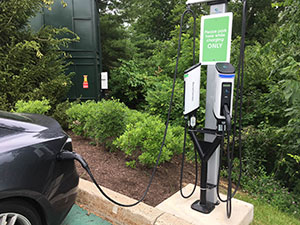Addressing Climate Change through eTools
Posted November 29, 2021

With climate change now a critical issue, it's important to consider making changes that help reduce our carbon footprint — from the trash we throw away to the purchases we make each day. While this can certainly be done on a personal level, it's up to the county and our municipalities to help encourage the best practices for residents and businesses to follow to help make a larger impact.
Chester County has implemented various policies and initiatives that help address climate change in recent years, such as the adoption of the new Climate Action Plan this past October, the updating of the Clean Energy Webpage, which provides information and resources on topics like solar energy, and the creation of an Environmental and Energy Advisory Board.
As noted on the Planning Commission's Climate Action webpage, the county's Climate Action vision is "to reduce the county's contribution to global climate change and equitably improve the health and well-being of the community by: reducing greenhouse emissions through government leadership and collaboration, mitigating impacts of climate change through resiliency and planning, and transitioning to clean and sustainable energy generation." Through these goals, the county hopes to reduce greenhouse gas emissions by 80% by the year 2050.
Supporting the use of electric vehicles (EVs) by making recharging stations more accessible to residents and businesses is one way to help achieve this goal, as EVs help to reduce carbon emissions, improve air quality, and promote energy efficiency.
Additionally, clean and sustainable energy is an important topic as it helps to mitigate the impact of climate change, contribute to a more reliable energy network, support economic growth through the creation of new jobs, and provide cost savings for residents and businesses.
Through the Delaware Valley Regional Planning Commission's Renewable Energy Ordinance Frameworks, municipalities can develop and update ordinances to govern the siting of small-scale renewable energy systems within their community.
Examples of alternative energy resources throughout the region include Montgomery County's Solar Information webpage, Bucks and Cumberland County Planning Commissions' model ordinance and information guide, PECO's Solar for Home and Business webpage, the PA Department of Environmental Protection's Solar Share Fact Sheet, and many others.
The Planning Commission's eTools cover a wide array of planning topics, from natural resources to economic development. The tools are easy to read, providing a quick overview of each topic, a brief explanation of how it works, and considerations for addressing the topic or regulating use. An alphabetical listing of eTools is available in our Municipal Corner.

